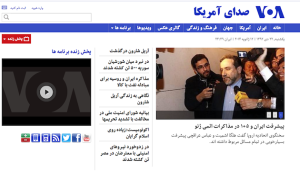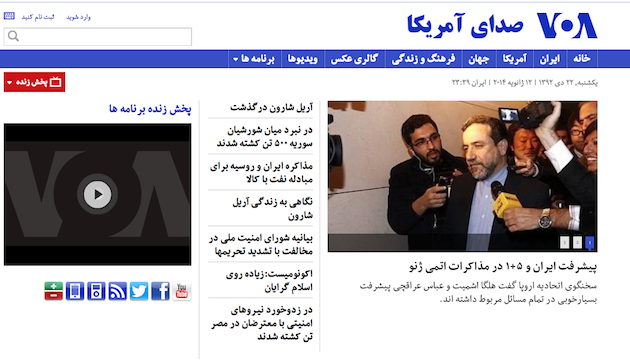BBG Watch Commentary

The embattled Voice of America (VOA) Persian Service was today (Sunday. Jan. 12) hours behind BBC Persian Service in reporting online on a major White House announcement that the interim Iran nuclear deal will take effect on Jan. 20. The VOA Persian Service was also hours late in reporting online on President Obama’s written comments on this major news development.
The news also appeared first on the BBC English website, with quotes from President Obama’s statement, before VOA English website reported on it. RT (Russia Today) English website also reported the news of the Iran nuclear freeze date before Voice of America did.
This was not a case of unconfirmed facts requiring further checking since the White House statement and statements from Iranian diplomats were available to the media, including both VOA and BBC.
Iran’s state English language media outlet Press TV was also a few hours ahead of VOA in reporting on the effective date of the nuclear deal, but its initial report did not include details of the White House statement. Later Press TV also reported on President Obama’s statement.
As of 6:30 PM ET Sunday, the VOA Persian Service Facebook page still shows no posts on the White House announcement of the effective date of the Iran nuclear deal or anything on President Obama’s statement.
A post on the BBC Persian Service Facebook page on this news story shows that it had been posted seven hours ago. As of 6:30 PM ET Sunday, BBC Persian Service Facebook post shows over 3,000 “Likes.”
VOA Persian Service website report, which was posted late, shows only 2 (two) Facebook “Likes” as of 6:30 PM ET Sunday. As of this time, the VOA Persian Service Facebook page has not been updated for five hours despite a major U.S.-Iran political news development.
The VOA Persian Service, which is also referred to as PNN (Persian News Network) or Persian Division, has seen a number of scandals and leadership changes in recent years. Its programs were managed at one time by VOA Executive Editor Steve Redisch.
Voice of America Director David Ensor announced recently that Setareh Derakhshesh had been selected to be the new Director of VOA’s Persian Division.
But VOA’s failure to report promptly on the Iran nuclear deal and the White House announcement is not only related to the Persian Service. It is believed to be caused by a reported near collapse of timely, balanced and comprehensive news reporting by VOA’s Central English Newsroom under arrangements which were put in place by Redisch and Ensor.
Longtime observers of VOA say that running a successful language service has become practically impossible under the current central leadership and management culture enforced by top VOA executives. Even best journalists and service directors are powerless and their advice and complaints are ignored by top level executives. Both the VOA Central Newsroom and language services have been stripped of resources by the ever growing central bureaucracy to a bare minimum, especially on weekends.
An award winning journalist, Setareh Derakhshesh has a good reputation among VOA broadcasters. She has been Acting Director of VOA Persian since September of 2013 when Billy Otwell stepped aside and returned to his previous work in the Office of Performance Review, after a period helping VOA out running PNN. Prior to this, Setareh Derakhshesh was Deputy Director, Executive Editor, and Managing Editor of the Division. According to a VOA announcement, she played a key role in the launching of VOA Persian television to Iran, serving as the lead anchor and managing editor of its flagship news show. Earlier in her career, she worked as an editor, reporter and airshow talent for our radio broadcasts to Iran, as well as a news writer in Central News and broadcaster for the former VOA English News Now program.
It is not certain whether in the current dysfunctional management environment at the whole organization, Setareh Derakhshesh or any other person will be able to to reform the Persian Service, even with the support from the Broadcasting Board of Governors (BBG) which under new leadership of BBG Chairman Jeff Shell wants to change the management culture at VOA. This may be impossible to achieve without personnel changes at VOA’s executive level.
The Weeekly Standard reported last week that the “Broadcasting Board of Governors (BBG), whose board members include Secretary of State John Kerry, is looking for a contractor to produce a ‘weekly entertainment show that must be aesthetically and musically appealing to VOA’s [Voice of America] audiences in Iran’.”
But a new program described in The Weekly Standard report, “Voice of America Seeks Farsi Language ‘Hollywood News’ TV Show to Air in Iran,” will not be enough to solve management, employee morale and news reporting problems that affect all Voice of America language services, starting with the English website but having a negative impact on the Persian Service and all other services and operations as well.
Current VOA Persian Service programs to Iran were criticized by an Iranian human rights activist at a Dec. 2013 panel held in Washington, DC by the Foundation for Defense of Democracies. A human rights activist said that opponents or the Iranian regime are having a hard time getting on VOA programs to Iran, which — according to critics inside and outside Iran — focus more on the regime than the opposition.
The title of the panel, in which former VOA Director Robert Reilly and former Broadcasting Board of Governors (BBG) Chairman James Glassman participated, was: “Is the West Losing the War of Ideas?”
“I’m hearing a lot of concerns coming from Iran, being Iranian, that Voice of America right now is the voice of more pro-regime people and not people who what regime change in Iran. You don’t hear their voice,” a U.S.-based Iranian human rights activist said. So what is the role of the Voice of America?, she asked the panel.
VOA Director David Ensor, who was in the audience, responded to criticism by saying that the Voice of America is a news organization open to many voices, both in the United States and by phone in Iran.
“I do not speak Farsi and can’t follow every single sentence of what is broadcast, but we keep a pretty close eye on things. And, as I said, we stand for freedom. Um, um, we broadcast comprehensive news. People in Iran don’t get it unless they listen to us or the BBC. There is no other way,” said VOA Director David Ensor.
VOA Director David Ensor may not even be aware that he is only partly right. Press censorship in Iran is real, but the Voice of America is slow and unreliable in delivering news to Iran, including important U.S. news — as we saw today. BBC is both fast and reliable and has a much greater following in Iran than VOA.
A video of the full seminar is included at the end of this report.
BBG member Matt Armstrong recently sharply questioned David Ensor on VOA’s failures to adequately cover breaking news. Ensor responded that it is a “resource issue.”
Critics counter that while insufficient resources may have some impact, much of the blame rests with Steve Redisch and David Ensor and their management practices, such as allowing posting hundreds of news reports in English and other VOA languages on the British royal family while important news events in Washington, DC are not being covered by VOA. Critics also point to dismal employee morale.
Members of Congress, have been expressing concerns about VOA’s Persian Service for years.
At the House Foreign Affairs Committee Hearing on Reforming the Broadcasting Board of Governors (BBG), held on June 26, 2013, Rep. Theodore E. Deutch (D-FL) was especially critical of VOA programs to Iran.
REP. TED DEUTCH (D-FL): Why? If I can just ask, is the mission so unclear? Is it so muddled that it would be impossible for the editors, for the people who run the station to know, that on the election day, when the entire world is focusing on your country, that the news network might actually cover the news taking place in that country? And if so, how do we fix that? How do we clarify the mission? Who needs to do it? Who needs to be told? What has to happen so that they actually behave like a news networks so that the Iranian people can get good, can get clear, real news from this outlet?”
At the 2013 seminar by the Foundation for the Defense of Democracies, the panel discussed, “Is the West Losing the War of Ideas?” The panel was moderated by FDD President Cliff May and including James K. Glassman, a member of the Broadcasting Board of Governors, Robert Reilly, a former head of the Voice of America and the deputy editor of the Wall Street Journal editorial page, Bret Stephens.
